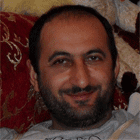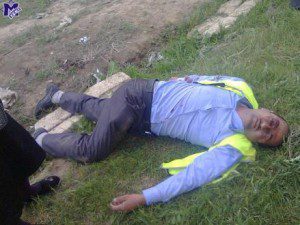Index relies entirely on the support of donors and readers to do its work.
Help us keep amplifying censored voices today.
 On 18 April, Index award-winner Idrak Abbasov was brutally attacked while he reported on the demolition of houses in his village. Rebecca Vincent recently visited him at his home outside Baku
On 18 April, Index award-winner Idrak Abbasov was brutally attacked while he reported on the demolition of houses in his village. Rebecca Vincent recently visited him at his home outside Baku
Last week Azerbaijani journalist and Index award-winner Idrak Abbasov was brutally assaulted. As members of the international press apply for visas to cover the Eurovision Song Contest, local journalists continue to face attacks and intimidation. Celia Davies reports
 The first photos of Idrak Abbasov were met with confusion and fear. The well-known Azerbaijani journalist was lying unconscious on the ground, his right eye swollen and black, his face bloodied. He was still wearing his luminous yellow press jacket. Later photos showed him in hospital, where he lay unconscious for close to six hours.
The first photos of Idrak Abbasov were met with confusion and fear. The well-known Azerbaijani journalist was lying unconscious on the ground, his right eye swollen and black, his face bloodied. He was still wearing his luminous yellow press jacket. Later photos showed him in hospital, where he lay unconscious for close to six hours.
Abbasov is still in hospital, suffering two broken ribs, three fractured ribs, cranial trauma, and damage to his right eye. One week on from his attack, his vision is blurred and the full extent of his head trauma remains unknown. He will not be discharged for at least another two weeks.
Less than a month ago, Abbasov was in London, collecting the Index on Censorship award for investigative journalism. Reflecting on the increasing restrictions on Azerbaijan’s struggling independent media, Idrak acknowledged that “For the sake of this right [to the truth] we accept that our lives are in danger, as are the lives of our families”.
On his return to Baku, he continued his work, heading out on 18 April to film the second round of demolition work in a residential area close to one of Baku’s numerous oilfields. Behind the demolition is the powerful state oil company SOCAR, which says the housing is illegal; the residents say they bought the land in good faith. When Abbasov began filming, SOCAR employees violently assaulted him. According to eyewitnesses the police looked on.
The other journalists at the demolitions, including Gunay Musayeva of Yeni Musavat newspaper and two cameramen for local media freedom NGO the Institute for Reporters’ Freedom and Safety (IRFS), have spoken about the chaos at the scene. Musayeva was also attacked by guards but did not require hospitalisation; the taxi the cameramen arrived in had its windscreen broken, but the men inside were unhurt.
Abbasov was visited in hospital yesterday (25 April) by a group of SOCAR officials, who told him they would be leading an investigation into the incident – the Binagady Police Department has also launched a criminal case based on charges of hooliganism, to which Abbasov objects. “This wasn’t hooliganism; this is an Article 163 case, obstruction of the lawful activities of a journalist.”
A statement issued by the local EU delegation in response to Abbasov’s assault declared the incident “yet another example of unacceptable pressure [to which] journalists in Azerbaijan are exposed”.
This brutal attack comes as members of the international press are applying for visas to come to Baku for the upcoming Eurovision Song Contest in May. The Azerbaijani Prime Minister has promised Eurovision organisers that international journalists will be free to carry out their work; the day before the SOCAR incident, President Ilham Aliyev himself declared to the Cabinet of Ministers that freedom of expression in Azerbaijan is guaranteed.
The day after the incident, the Ministry of Internal Affairs released a statement reporting that “200-250 residents of the settlement beat and injured [SOCAR] employees”, naming Abbasov as “a local resident”. The Azerbaijani Human Rights Ombudsman also visited him in hospital, and has called for a full and objective investigation. In a separate press release, the Presidential Administration condemned the violence, but deemed it unrelated to Abbasov’s professional activity. The Department Chief there supported statements by SOCAR claiming that the journalists had not been wearing press jackets – in the face of photo evidence to the contrary – and finished with a warning to media representatives: “journalists covering such actions must wear special clothes, [and] must not interfere in the process.”
Amidst these competing versions of events, the president’s confident assurances remain largely at odds with an often hostile reality, and international journalists are advised to be vigilant about their personal security, as well as the safety of any local staff – fixers, drivers, and so on – with whom they are working.
When asked, Abbasov said that his attack should not deter the international media from covering the event. Emin Huseynov, Chairman of IRFS, one of Abbasov’s employers, echoed his advice:
Write about Eurovision. But be aware there is a darker, sadder story behind the shiny buildings and expensive shops that will continue when the singing is over.
With seven journalists already in jail and the dust only just settling following the high profile attempted blackmail of leading investigative reporter Khadija Ismayilova, independent media outlets and NGOs are starting to worry about what will happen after Eurovision, once Azerbaijan is no longer under the international spotlight. Many fear that there will be a backlash against all those who have spoken out against human rights and free expression violations – and that once Eurovision is over, Azerbaijan will drop off the international agenda.
Celia Davies is Program Development Manager at the Institute for Reporters’ Freedom and Safety in Baku, Azerbaijan
ADVOCACY LETTER
Dear President Aliyev,Re: The brutal attack on Idrak Abbasov and assault of four other journalists on 18 April 2012
The Azerbaijani authorities must launch an immediate, independent and transparent investigation into the brutal attack on investigative journalist Idrak Abbasov and the assault of journalist Gunay Musayeva on Wednesday 18 April 2012 in a village on the outskirts of Baku. The subsequent assaults on three other journalists, Esmira Javadova, Elnur Mammadov and Qalib Hasanov, who tried to report on the attacks against their colleagues, should also be part of this investigation.
Index on Censorship joins the call for an immediate, independent and transparent investigation into the brutal attack on investigative journalist and Index award winner Idrak Abbasov
(more…)